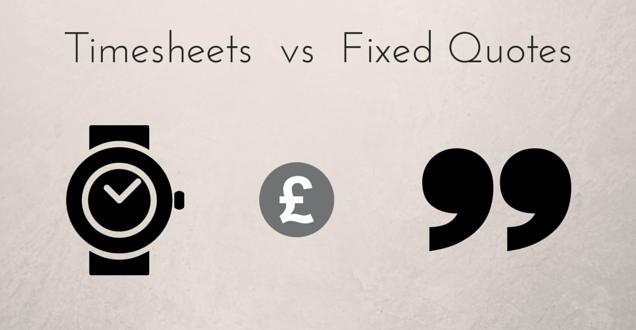The benefits of timesheets vs quotes
Quoting for a web project is always a difficult thing to calculate accurately because there are so many variables but Webigence recommend using the timesheet method to be fairer all round.

There are constantly new and better ways of doing things in web development that mean things could take longer than the last time you built something similar. When pricing a project you tend to base costs on what you have done before but with the knowledge that if your price is too high you might scare the clients off and not win the work, on the other hand if you price it too low then you could end up making a huge loss and not able to pay the bills.
No two projects are exactly the same so there are always elements of the unknown and new learnings you find along the way. When you’re pushing new ground and finding better ways to do things using more up-to-date technology you cannot predict how long things are going to take. So a loose estimate is the best you can give. The trouble is clients often want to know a fixed cost up-front and even if they agree your costs are an estimate they often mentally class it as a fixed cost and are surprised or annoyed if you go over this estimated amount.
If you are asked to give a fixed costs you therefore have to over-estimate the time and costs in order to cover yourself as a business because of the unknowns. However, Webigence has found that using a timesheet style of costing works well for both the business and the client as the client only pays for the time it takes to create each step/feature/element of the project, paying for them at the end of each month. We also give clear visibility to the client of the timesheets so they can keep track of how much is being done and therefore the costs so they are aware of the costs before the invoice is sent to them.
We find that the timesheet way often ends up 20% cheaper and quicker but we often come across clients with the mentality that a fixed quote is better because they know exactly what they are paying and it won’t be a penny more. Timesheets involve trust, which first time clients often don’t have with a new company but ultimately the client should, in the first instance, choose a company that they believe has the right experience and they can trust to deliver their project.
Focusing on the team and the experience is something we have talked about before in our blog ‘Choosing a CMS; Do I go bespoke proprietary open source?’
The benefits of using Timesheets are much more transparent and fair for both the client and the development company:
- you only pay for exactly the time it takes which is fair for both sides
- it is quicker in that you often skip out the quoting admin process
- you can use the agile process to reassess what you want/need at each stage and add more things in
Things for clients to consider:
- You must be savvy in planning your project and allocating the right amount of time in the right places i.e. don’t spend too much time on the detail in the visual design stage and scrimp on the programming stage or you’ll end up with something that looks good but doesn’t function.
- You must set a priority list for your minimal viable product (MVP) and get that achieved as the first port of call and then add in the detail, finesse and any extras you want, budget permitting.
- Have a clear set of requirements/specification list for your MVP and what you want included. This will make it much easier for the company to understand what you want and how to build it in the best and quickest way.
- Declare your budget or rough amount you’re willing to spend. If we know your requirements and your budget we can find solutions that meet both. We want a win-win so everyone is happy.
- If you have changes or extra functionality you want, think them through carefully, discuss them with us and judge if you really do want them implemented immediately, part way through the project or wait until the end of the MVP stage. Are they critical or can they wait for phase 2? Do you have extra budget for these things or will something else have to suffer/be taken out of the specification list in order to add them in?
If you’d like to tell us about a project where our skills and experience would be well suited, please do call us on 020 8739 0030.
Blog written by Natalie Wiggins